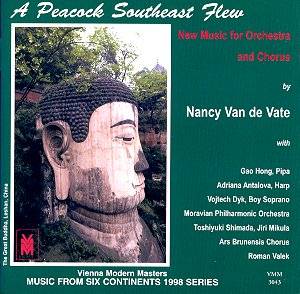Nancy van de Vate was born in Plainfield, New Jersey
but now lives in Vienna having dual Austrian and American citizenship.
Her works are about 150 in number and in all genres. She studied at
first at the Eastman School of Music and, among her other studies, were
those in electronic music at Dartmouth College. As with the late Vivian
Fine she is a feminist and founded the International League of Women
Composers. She has received many awards and lectured on musical topics
all over the world. She is well-known in Asia and this is obviously
the impetus behind her concerto for pipa and orchestra. I have always
wondered why Asians have such long-winded and inane sayings used as
titles or subtitles in music. The ancient Chinese story of the title
is really banal. I cannot see that the peacock is an erotic bird, either!
The pipa is a four stringed Chinese lute which has
been known for some 1800 years. Its range is A a tenth below middle
C to three Es above.
This concerto is interesting but not impressive. The
instrument's sound is so limited and just plinks and plonks. The work
is hindered by balance problems. As far as I can say the soloist is
very good but 22 minutes of this uneventful music is too much for me.
Western Front is a different kettle of fish.
As you may have gathered it is based on the First World War story ‘All
Quiet on the Western Front’. It was premiered in Czechoslovakia in June
1998 by the artists on this CD. This is a good piece which juxtaposes
the tragedy and futility of war in the trenches and the power and brutality
of war itself. The orchestration is admirable.
Harp concertos are notoriously difficult to compose
largely because of the limitations of the instrument and its being trammelled
by its diatonic nature. You cannot write freely or chromatically for
this instrument. Therefore a modern sounding harp concerto is rare.
Only Ginastera has come anywhere near to writing a concerto for the
harp with a contemporary sound. And that is a very fine work indeed!
Van de Vate tries to be novel and uses the Phrygian mode. There are
moments of impact but as with all this music I am left with the dilemma
that it could have been composed by any of fifty composers. There is
no original voice, no innovation.
The soloist, Adriana Antalova, deserves mention. She
graduated from Bratislava Music Academy in 1993 and is now the principal
harpist with the Slovak Radio Symphony Orchestra. She has made two previous
recordings on this label with music by Nancy Van de Vate and a concerto
by one Aaron Rabushka.
Recently two new British symphonies were broadcast
and, again, one was left with this one impression that they could have
been written by anyone in the last 20 years!
The Choral Suite from Nemo comes from the opera
Nemo: Jensits von Vulkania based on the sequel to Jules Verne's
‘Twenty Thousand Leagues under the Sea’.
It is pleasant enough and often colourful but , again,
it is not music that is arresting.
And why the expression boy soprano? Why not treble?
[see footnote]
I enjoyed much of this disc but I fear it is unlikely
that I will listen to it again ... or, if I do, it will be from necessity.
David Wright
[Footnote] Ms Van de Vate comments
that since "treble" can mean either a male or female voice,
the word is not sufficiently precise in this context. Treble is the
correct expression in American English.


